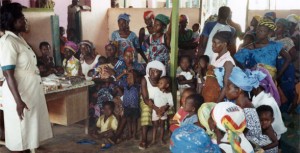
The endemic poverty in Ghana’s Northern Region is perhaps most visible in the poor health situation of its residents.
The lack of food for many communities in the region means that people become malnourished, and suffer from all its attendant health problems. Lack of clean water and open defecation compound health problems, exposing people to a range of preventable diseases.
Health services are minimal in the region. Because the Northern Region is largely rural, with small villages of one or two hundred residents scattered across a vast area, it is difficult to provide timely health services to communities. Very few people in the Northern region can claim to live less than one hour away from the nearest health clinic.
With almost 90% of the region’s inhabitants working as subsistence farmers, the cost of treating sick people is an enormous financial burden for them. A malaria treatment, for example, might cost 1/3 of that family’s income for the year.
HIV/AIDS is spreading throughout Africa, and Ghana’s Northern Region is no exception. Although it is difficult to gain accurate data on infection rates in the area, clinics have observed that HIV infection rates are particularly prevalent among those who end up leaving the region in search of work.
A Holistic Approach
Improving people’s health can only be accomplished by addressing the many factors that impact their health. GRID and NEA agree with The Ottawa Charter for Health Promotion that there are multiple prerequisite conditions for health, including:
- peace,
- shelter,
- education,
- food,
- income,
- a stable eco-system,
- sustainable resources,
- social justice, and equity.
We therefore implement our more obvious health-related activities in conjunction with poverty alleviation activities.
Health Education
GRID and NEA prioritize health education in communities where we serve. By training health officers to visit households, provide basic health education, and observing any diseases, we are able to equip families with the knowledge that they need to reduce their exposure to preventable diseases. In a region where nearly three-quarters of the residents are illiterate, it is important to provide this kind of educational service at the community level.
National Insurance Promotion
In 2003, the Government of Ghana’s introduced the National Health Insurance Scheme. This is an extremely valuable service for residents of the Northern Region, who often delay seeking treatment for sickness because of the cost of care. Now for a low annual fee, residents can receive health care at public clinics without bearing any additional costs. NEA is therefore educating community members about the importance of this scheme, and encouraging them to enroll.
Intensive Surgical and Clinical Support
In 2007, a team of medical professionals from Canada and the UK volunteered their time to treat patients in the area where NEA is working. This team has become an annual event for NEA, one that we are deeply grateful for. This team of highly qualified, dedicated people brings to the area all of the equipment and medicines needed to conduct surgery and treat diseases. In about two weeks they handle between 6,000 and 8,000 patients who otherwise would not recieve assistance.
Clinic Construction
In an area that has so few clinics, one of the ways that GRID and NEA can help is by building clinics and working with the Government of Ghana to staff those clinics with appropriate medical personnel. For example, with funding from the Canadian International Development Agency, GRID and NEA were able to build a maternity ward for the Bamboi Health clinic. In the first three months of 2009 alone, over 300 children were safely delivered at this clinic!